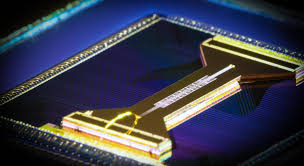Source: zdnet.com
Microsoft this morning announced a partnership with multiple companies for quantum computing capabilities running in its Azure cloud computing service during its “Ignite” developer conference, with one of the partners being industrial giant Honeywell.
Honeywell’s head of its quantum effort, Tony Uttley, spoke with ZDNet about the announcement, explaining how quantum computing is on an evolutionary path from assisting conventional computing to someday usurping it.
“For those who don’t even know Honeywell is in quantum, think of us now as a fully fledged participant and a real contender,” said Uttley.
The Microsoft offering is dubbed “Azure Quantum.”
When asked if quantum computing requires quantum “supremacy” to be demonstrated, as Google did two weeks ago in Nature magazine, Uttley responded that it’s a matter of evolving the science through multiple periods of increasing sophistication.
“We think of three eras,” says Uttley. “First is the era in which quantum computers act as co-processors” for classical computers, to help accelerate some of the work that the classical computers do. Then comes the era of the “classically impractical,” in which some things that are feasible to do on the classical computer nevertheless might be worth doing in a quantum system nevertheless might be better done on a quantum machine for the dramatic speed-up purposes.
And last comes the era of the “classically impossible,” perhaps things such as factoring large numbers into primes, are really be infeasible on a classical computer.
“We are on the verge of classically impractical,” is how Uttley described the present situation.
More important at the moment than fancy algorithm demonstrations such as Google’s is the basic fidelity of any quantum device, perhaps. Although Microsoft has for a long time been developing its own quantum circuitry, the partnership with Honeywell offers the company access to Honeywell’s hardware made up of “trapped ions.” An ion, of course, is an atom that has a net positive or negative electrical charge. The trap in this case is a fabricated device, like a computer chip, that can be used to manipulate those ions, similar to moving electrons through the gates made up of silicon transistors.
Trapped ions is a scientific area of exploitation going back at least 24 years. Ions are perceived as having some desirable properties versus other quantum approaches, including the relative stability of the qubits created with them, thanks to relatively long “coherence times” of the qubits (the period of time during which the all-important quantum entanglement can be maintained.)
To Uttley, all this adds up to a more reliable quantum device than some other approaches, on average.
“There’s a a lot of discussion of how many qubits do you have,” says Uttley. “But more rarely asked is, What can you do with those? Are they fully connectable?
“At least as important is the question of what is the fidelity” of the qubits, says Uttley, “how accurate are they.”
Although Honeywell has fabricated ion traps to build its computer, Uttley is short on details of the gate configurations and circuit configurations and technical details of the trap’s properties, while promising to reveal more information on the technical side at a future point. Some interesting technical material is provided in a just-published paper posted on the arXiv pre-print server, “Subspace benchmarking high-fidelity entangling operations with trapped ions.”
For the moment, says Uttley, the focus is going to be on working with customers in a beta release by the end of this year, with a more public unveiling in early 2020.
For Honeywell, as Uttley sees it, quantum is a natural extension of the company’s decades-long legacy in control systems. And quantum computing offers the potential to speed-up machine learning algorithms for various industrial applications that could be of special interest to Honeywell customers, such as for optimization of petrochemical processes and for optimization for air traffic control, and any number of other things that can be defined as control problems first and foremost.
(More information on Honeywell’s Quantum Solutions unit is available on the company’s Web site.)
Microsoft states in today’s announcement that “we’ve been working together with a global quantum community to innovate across every layer of the quantum stack — from applications and software down to control and devices.” Microsoft is also using offerings from startups 1Qbit, IonQ and QCI.
Microsoft announced users of the system, such as Case Western Reserve University.

